Swarthmore Faculty Offer Reflections on Israel/Palestine Conflict

During wartime, when there is no single answer or “side” to take, when language itself can be more of a barrier than a bridge to understanding, what comes next? How can we function, let alone go forward, in the face of so much anger, pain, and confusion? Faculty members from a range of disciplines address these and related questions: What is working? What resources are they drawing on? What lessons from their respective fields might be useful right now?
Moriel Rothman-Zecher, English Literature | Edwin Mayorga, Educational Studies | Dominic Tierney, Political Science | Sam Handlin ’00, Political Science | Krista Thomason, Philosophy | Syon Bhanot, Economics | Joseph Towles, Engineering | Tim Burke, History | Pallabi Chakravorty, Dance | Ted Gup, English Literature
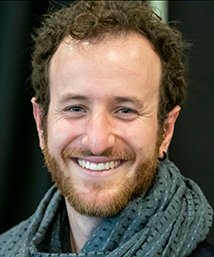 Moriel Rothman-Zecher
Moriel Rothman-Zecher
There’s no version of this suffering that isn’t taking place in my heart.
In such times, I turn to poetry — Naomi Shihab Nye, Yehuda Amichai, Jalaluddin Rumi, and especially Mahmoud Darwish [an acclaimed Palestinian poet who first read his poetry in the U.S. on Swarthmore’s campus in 2002]. His poem, “A Soldier Dreams of White Lillies,” was life-changing for me. In it, Darwish writes a portrait of an Israeli soldier who isn’t a demon or monster, but who is broken and wants to leave the land. It’s not the classic portrayal of an enemy. He got flack for that poem. As Darwish recalled in a 2001 interview, Israeli Jews asked, "How come Darwish wrote such a poem? Is he asking us to leave the country to become peace lovers?” Meanwhile, Arabs said, “How dare you humanize the Israeli soldier?"
Right now, I’m recognizing my own smallness. I don’t need to change anyone. What I can offer is some route to locate the grief and sorrow that sits beneath the pain and confusion that all of us feel — and me, too. There is no arrival.
THE OCEAN
(October 10, 2023)
When the veil lifts
from your eyes
and you see that
there are no demons
in this world, only
humans, then there
is no relief from
the suffering, the suffering
becomes an ocean
and there is no shore.
We watch our siblings —
siblings, not demons —
celebrate as our siblings
are hurt and killed,
and they do this because
they are suffering
and they want relief
and we cannot cheer
with them but nor
can we wish them
anything but relief, so
we hesitate to extend
the invitation for them
to join us out here
in the middle of the ocean
of suffering from which
there is no exit, but
we extend it anyway:
join us out here.
Maybe together we will
discover that being
human also means
having gills, shimmering
fins, that maybe after
all we can breathe
better from within
this ocean of salt water,
and we will hold each
other’s hands and kick
our tails and follow
the dead where they lead us.
Moriel Rothman-Zecher teaches creative writing at Swarthmore, where he is a visiting assistant professor of creative writing in the Department of English Literature.
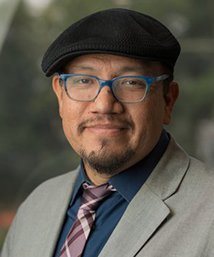 Edwin Mayorga
Edwin Mayorga
We all have content to cover, but when something happens that is so life altering on a global scale, part of our job is to model for students how to pause and really sit with it. That requires us as teachers, as I am trying to do with my student teachers, to ask: How does one facilitate heavy conversations?
One thing we can do as teachers is show humility and vulnerability, which is an invitation to our students to figure it out with us in a caring space. Students miss out if they don’t see we are human as well, and that we are navigating difficult things, too. We can’t presume trust, we have to earn it, and we can’t wade through complexities without it.
We won’t be exactly the same. How can we be, knowing full well our opinions and perspectives will be different? What’s the thing that can connect us?
For me, it’s peace and ending violence, in all directions. None of the harm is excusable, from my perspective. So we can model how we are trying to make sense of it ourselves. We also need to be anchored to a commitment to something. That commitment should be doing no harm and, at the same time, working towards some notion of justice. Whose justice? I’m committed to figuring that out, but again that requires building trust. It also requires us to be accountable, not just for what is happening now but, crucially, the past as well.
Scholarship is not emotionless. It’s about our interests and passions. The scholar in all of us needs to shine. The same thing we bring to our disciplines, I want to bring into our teaching and thinking about these larger global issues, so that we consider our emotions and relationships, along with the social, cultural, and political implications.
I was four days into my first student teaching experience, in New York City, when 9/11 happened. What really moved me were the ways the counselors came in the days after, checking in on each other and talking about how to keep each other safe. And we knew school is going to continue, but in what ways is life, and by extension school, different in the aftermath of these global flashpoints?
Sadiya Hartman talks about the “afterlife of slavery.” What’s the afterlife of war, terror, and upheaval? We certainly see the negative repercussions. What comes from it that’s about care and repair?
I remain hopeful that there will come a time when there is a ceasefire. One can hope and work towards that locally and globally. And then, if that day comes, are we ready to go about the work to continue on? We can’t lose sight of doing the reparative work that is essential to more just futures.
Edwin Mayorga is associate professor and chair of educational studies and the founder of the Education in Our Barrios Project.
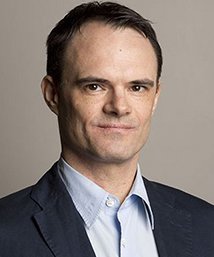 Dominic Tierney
Dominic Tierney
The liberal arts in general, and political science in particular, teach us to beware simplistic frameworks of good guys versus bad guys. The Israeli-Palestinian conflict is complex and the more one learns, the more complex it becomes. The people who are most confident about the solution often know the least about the issue.
Multiple things can be true at the same time: Hamas is a brutal and extremist group that committed appalling atrocities, and Israeli governments have made choices that oppressed Palestinians and closed off pathways to a Palestinian state.
We should beware a “zero sum” view of grief where admitting the sorrow felt by the other side is seen as diminishing the moral clarity of the “cause.” Otherwise, good people can end up apologizing for atrocities and seeing truth in terms of who it benefits.
The extremists on both sides supposedly hate each other, but they can act more like allies than enemies. Violence and radicalism by one side is a centrifugal force that deepens the conflict, buttresses the position of the extremists on the other side, and defeats their common enemy — the moderates. The ultras that scream at each other are often useful adversaries.
Most of all, we need a long-term approach to the conflict, focused on creating a better peace. Winning a war is not about killing, but about politics: deciding who rules and how. Those who press Israel to launch a major military campaign in Gaza, as well as those who demand an immediate ceasefire, need to explain how this will produce an enduring peace.
Dominic Tierney is a professor and chair of political science at Swarthmore, a senior fellow at the Foreign Policy Research Institute, and an expert on American foreign policy.
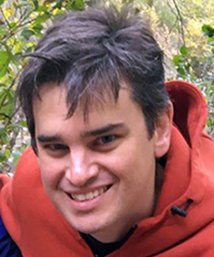 Sam Handlin ’00
Sam Handlin ’00
Supporters of both Israel and the Palestinian national project have learned to frame the conflict in terms most likely to win the “hearts and minds” of politicians and ordinary people abroad, especially in the U.S. and Europe. As a scholar and teacher of comparative politics, I often confront questions related to complex social scientific concepts and how we can rigorously apply them across the world. While I am not a specialist in the politics of the Middle East, I can share a few thoughts about the use of four such concepts — occupation, democracy, indigeneity, and settler colonialism — that are central to contemporary struggles over the framing of the conflict.
Supporters of Israel often say that the state is a democracy engaged in an occupation of the West Bank. A defining feature of occupation is that the occupying power intends for its presence in that land to be temporary. Yet Israel has now “occupied” the West Bank for 56 years while steadily increasing the number of settlers and largely abandoning any pretense of pursuing a peace process that would lead to Palestinian sovereignty. Therefore, the situation is more accurately described as an annexation, in which the territory was incorporated by force into the domain of the Israeli state, akin to the recent Russian annexation of the Crimean Peninsula or the Moroccan annexation of the Western Sahara in the late 1970s.
The one-state reality produced by annexation undermines the claim that Israel is a democracy. While we associate many broad principles with democracy, almost all working definitions of democracy as a system of government highlight the importance of (a) free and fair elections, (b) full or nearly full adult suffrage, and (c) broad protection for civil liberties. In the West Bank, millions of people are ruled by the Israeli state yet denied both b and c. It is only by pretending that the West Bank is not really ruled by the Israeli state, and therefore Palestinians not people denied equal political and civil rights despite living under the rule of that state, that supporters can maintain the pretense that Israel is a democratic polity.
Supporters of the Palestinian national project now often frame their struggle as an indigenous people fighting against a settler-colonial power. Indigeneity is a complicated concept lacking a single broadly accepted definition [PDF] that is particularly difficult to apply in a context like Israel/Palestine that has been ruled by many different empires over thousands of years, which have both brought and displaced waves of different peoples. Given this history, and the complexities involved in defining indigeneity in general, there is little credibility to the claim that this area has only one indigenous people. A fairer assessment would conclude that both Palestinian and Israeli nationalisms are founded on deep and legitimate ties to the same region.
Settler colonialism is a term referring to a particular subset of colonial rule, in which an outside polity not only forcibly dominates another territory inhabited by an indigenous people, but also sends its own citizens to inhabit that territory and displace or kill the local population. One could reasonably argue that Israel’s annexation and settlement of the West Bank has settler-colonial dynamics. Critics of Israel, however, often speak of 75 years of settler colonialism, making the more sweeping claim that the foundation and ongoing existence of the Israeli state are instances of settler colonialism. This claim is misleading at best. As noted above, both Israeli and Palestinian nationalisms are founded on deep and legitimate connections to the land. Further, while Jewish immigration to Palestine reached its height under British colonial rule, the Zionists were not citizens of a colonial power sent to displace the existing population, but refugees fleeing persecution. Zionism was a complex historical phenomenon simply not analogous to notorious instances of settler colonialism like the European conquest and settlement of the Americas.
Why does any of this matter? While I cannot pretend to have the answers about how to solve such a deep conflict, I believe that any long-term resolution will be premised upon an affirmation of the humanity and equality of both peoples and the legitimacy of both their claims to the same stretch of land. Pro-Israel rhetoric often denies the humanity and equality of Palestinians, by claiming the mantle of democracy while creating convoluted justifications for denying them basic rights under a single apartheid state. Pro-Palestinian rhetoric often denies the legitimacy of the Jewish people’s claims to the land, by casting them as colonists who are fundamentally less deserving than an indigenous population. Let’s dispense with both claims.
Associate Professor of Political Science Sam Handlin ’00 studies the comparative politics of developing countries, with a focus on democracy, authoritarianism, and electoral politics.
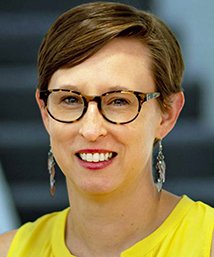 Krista Thomason
Krista Thomason
As a history of philosophy person, I find it helpful to read the work of people who thought their world was falling apart. Montaigne writes movingly of the French civil wars in the late 1500s. If they’ve survived it, then maybe we can find a way out. It may be cold comfort for some, but it helps me.
Right now, our ability to engage in moral dialogue is pretty impoverished. Other than on a campus, we as a populace don’t have many opportunities to engage with a wide array of perspectives in human conversation. Real world dialogue requires that ability to sit down, look at somebody, and open your ears to them with generosity. Space for that kind of conversation is not to be found in the world we live in right now.
The moral philosopher in me wants to weep for that loss. Moral dialogue is one of the most important things that we do. My job is to convince you, give you reasons and arguments to accept the position I’m offering. The whole premise is built on having an audience who doesn’t already agree with you.
Instead, we think if we have the moral high ground, then anything we might do is justified. Or that the louder I yell, the more committed I am to my beliefs. We’ve traded moral dialogue for moral statement-making. Almost no moral philosopher in the world would say there’s something wrong with having a conversation with someone who has different views than you do.
Most of the time, moral conversation is happening in a time and place when we are both safe. We might be upset and may have stakes in a situation, but it’s the time to have a conversation. Then there are times when that is not the right thing. If my family is in danger, now is not the time to press me on where we disagree. Maybe now is the time to say, “I’m sorry your family isn’t safe.” It’s the time for comfort. That’s what's called for in that moment.
We lose that thread very quickly. You have to be attentive to what might be behind people’s words, not just their actual words. But that relies on a generosity and willingness to really hear people and think about where they’re coming from. Grace. Everyone needs it.
Now, I don’t want to extend grace to people committing atrocities. But I can’t give up the idea that they are still human beings. They are engaging in monstrous behavior, but do they exit being human? If I eject them from the human community, then what does that make me? And will it actually help if I say they’re not human? My suspicion is no. The more you do that, what happens the next time around, the next atrocity? Humans have done terrible things literally from the beginning of human existence.
That does not mean forgiving, but it does mean understanding how a human being can come to do such terrible things. Otherwise we are not really fixing the problem. If I’d like to prevent other human beings from doing such things, then those are questions I should ask.
I teach about genocide and why people commit atrocities. There’s always a voice that doesn’t like asking these questions because they think explaining means that you excuse it. It does not. In The Nazi Conscience, Claudia Koonz examines what’s behind Nazi ideology. And that’s important work if you want to understand how people become Nazis. I think people get so unnerved because it forces you into a hard mental space.
Understanding why someone commits atrocities also means understanding why you didn’t become someone who commits atrocities. How does a seemingly normal person kill their neighbor? That’s really terrifying.
A couple wrong turns on the internet and you, too, could become radicalized. You want to believe they’re so different from you, but it’s not true. And that’s a hard truth.
People get upset when you say it’s morally complicated. But there are moments of moral clarity, even within something that’s wildly complex. It’s when we see humanity in each other. If anything is going to help us get out of this moral morass, it’s keeping each other’s humanity clearly in view. It’s not easy, but if we can remember that person is another human being, that’s solid moral footing. And that’s what you need in situations like this. You need somewhere to plant your moral feet. A north star.
Associate Professor of Philosophy Krista Thomason is the author most recently of Dancing with the Devil: Why Bad Feelings Make Life Good.
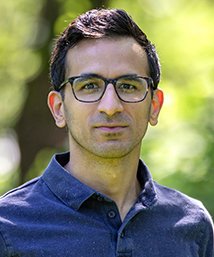 Syon Bhanot
Syon Bhanot
Research in behavioral economics and social psychology has consistently shown that people are quick to line up behind their “tribe,” so to speak. That’s how people are; it is somewhat hardwired into us. Social identity is very powerful.
There’s also lots of research that shows that when we are in highly emotional states, we don’t always act in rational ways. We can find ourselves taking up positions and defending actions we would otherwise abhor. I would argue that is happening now. You may feel you are “against terrorism,” but also that you support marginalized groups — so, after the initial Hamas attacks, you might have found yourself in an awkward position. Now, a historically marginalized group has segments that did horrible things — things that should not be defended. This can lead to cognitive dissonance, and difficulty resolving inconsistencies in what you support.
Supporting Hamas’ actions and supporting the broader Palestinian cause (or Palestinian civilians) are very different positions, but they are getting entangled in disturbing ways. I suspect many here in America who defend Hamas’ actions would be horrified if they were actually required to live under Hamas rule. It’s especially hard psychologically to sort through these things when we are in “reaction mode” rather than thinking through what we should believe, collecting facts, etc.
In everyone’s mind, they are a “hero” and on the righteous side. Very few people wake up thinking, “I’m evil and my side is evil.” Hamas fighters believe they are right and justified, and so do the Israeli forces now striking Gaza. To think your side doesn’t have “right” completely on its side is hard. You can almost be pressured into feeling that any tactic is allowed because it’s “my group” who did it. This is a recurring pattern when engaged people find themselves reacting to conflict situations. It is what happened with German civilians who looked the other way during WWII, Americans after 9/11, etc.
It’s possible that everyone is wrong in a given conflict. In fact, that’s often true. Maybe the right view in the heat of the moment is not to support anyone perpetrating violence and to instead advocate for peaceful resolutions. But this can be hard, especially for people with social identities relevant to the conflict.
As a behavioral researcher, I try to observe the world and understand human motivations. There should be a space for that at Swarthmore and beyond — to zoom out and try to understand the situation with seriousness, humility, and empathy. I think our community is failing to do this right now. My training and disposition is to get in the proverbial “spaceship” and fly up in an effort to see the “big picture.” I feel you need to see the whole chessboard, not a little corner.
I’m married to an immigrant to the U.S., and I’m the son of immigrants. So while I grew up in the U.S. and feel (somewhat) American, I’ve always felt like an observer rather than an active participant in society. I know that sounds strange, but personally I like a little distance sometimes. That said, I’m an applied researcher. I’m very much interested in engaging the real world, not the theoretical one. So finding the right balance between engagement and distance is a constant challenge for me and, I think, for everyone at times like this.
Associate Professor of Economics Syon Bhanot is a behavioral and public economist who uses field experiments to study prosocial behavior and issues related to public policy, development, and poverty.
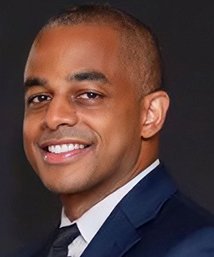 Joseph Towles
Joseph Towles
I’ve been thinking a lot about the situation in the Middle East and if an aspect of engineering could be of interest. This led me to design thinking, or human-centered design, an approach to problem-solving that actively seeks input from everyone who is affected by a problem as we try to understand its size and scope before ultimately finding a solution. Some would go farther and say it’s about collaborating with the people that you’d engineer a solution for and making them part of the process as collaborators in the enterprise. In this way of thinking, we articulate four steps:
Empathy. Make observations about what’s going on and learn about potential needs or opportunities that could make use of your expertise. Are all needs conflicting? Are there any common needs? Is there one big need? Using this approach in the best way possible means going in with an open mind to get as much information as possible from all stakeholders. The pool is broad. You learn from all of them.
Define. This is more research around the needs, to better understand them and discern the priorities. There could be financial or lifesaving considerations, or political ones.
Ideate. Develop an idea or set of solutions to address a set of compelling needs. What can we do? Is there a workflow? Is there something we can build? Something we can write? It can take a variety of forms. This brainstorming is iterative, and you do it in teams. There are no judgments, and the wilder idea, the better — at least to start. Think “blue sky,” meaning with no constraints from technology, infrastructure, money, or personnel.
Prototype. This does not always mean to build something tangible. It could mean building a workflow or idea. And don’t let go of the ideas you’re not using, in case the ones you carry forward don’t pan out. As you go forward, think of constraints — political pressures, market pressures, barriers to implementation. This step is iterative. You design to address the need, then test it. If it doesn’t work, then tweak it.
Emphasizing empathy is the most important part. Does this work? Go back to the stakeholders and ask them. That’s the validation step in engineering. Is this what you were after? It could be a flat no, a yes, or a yes and no. If you can’t satisfy all stakeholders, who are the most important stakeholders? It depends on the need you’re trying to address.
You could jump to solutions, but in engineering design, that’s not the best approach. If you start with a solution in mind, it biases the stakeholders you approach and how you approach them. You have to be solution-agnostic.
It’s difficult to do this if you’re bringing a strong idea to the table. You have to choose to trust the process. If you don’t, you won’t allow it to give way to solutions you would never have thought of.
Associate Professor of Engineering Joseph Towles specializes in neuromuscular biomechanics and engineering education.
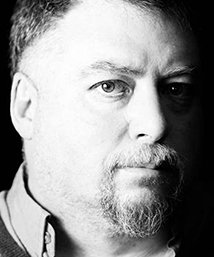 Tim Burke
Tim Burke
You have to think about the causes of what’s happened in Gaza and Israel. You have to keep that thinking from evacuating moral clarity about what’s happened. You have to do that thinking in tandem and then slowly and carefully bring them into relationship.
So yes, it matters that the government of Israel has consistently worked since the assassination of Yitzhak Rabin and the breakdown of the Oslo Accords to prevent the emergence of a Palestinian leadership with legitimacy in the West Bank and Gaza with whom they might negotiate a two-state resolution. Yes, it matters that the West Bank is being eaten away by settlements and that Gaza has become an open-air prison. Yes, it matters that Palestinians are subject to arbitrary repression and dysfunctional authority, whether from Hamas, the Palestinian Authority, Israel, or in Jordan. Yes, it matters that Israel’s existence has been threatened since the moment of its creation. Yes, it matters that Israel’s citizens have periodically faced waves of random murder and terrorism, fueling further building of walls and restrictions and bombardments in defensive retaliation. It all matters as a cause of the attack from Gaza and now the strikes against Hamas and Gaza.
The problem for many is that a recitation of causes instantly sounds like a pre-emptive diminishment of moral concern, an explanation intended as a hedge against recognizing agency, against assigning responsibility, against seeing the initial attacks for the inexcusable moral catastrophe that they absolutely are.
What rises out of doing both kinds of work, both kinds of thinking, is an actual politics that can speak coherently both about the world we want, the world the combatants should want, and about what kinds of things we should say and do on the way to it.
The call for a retaliation so fierce that it will permanently deter further attacks is a failure in both terms: It’s an assertion about causality that doesn’t fit with modern global history, and it’s a moral failure that contains within it the seeds of genocide. An analysis that understands that Palestinian nationalism became urgent and real in the Nakba has to (but often does not) understand that Israeli nationalism became urgent and real through the very same processes, which again inflects straight into a moral truth about sovereignty and security in the world we live in and might hope to live in.
I frame this all in terms of how we decide to talk together about a moment like this one so that we also understand that how we talk and how others act or will act are not quite the same things. Much as Hamas is not at “all Palestinians” (or even “all the people of Gaza”), neither is Netanyahu’s government at all “all Israelis.” And neither are we looking on in horror and anxiety more than what we are, a global public who care both about the moral stakes of the conflict, and what it might still cause. It is important that we talk without being too self-important in that talk. It is important that we listen without indulging everything being said. We are right to fear; we need to hope.
Timothy Burke is professor and co-chair of history at Swarthmore and the author of the Eight by Seven blog on Substack.
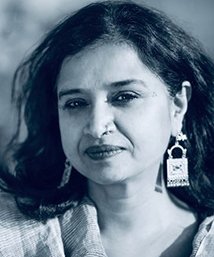 Pallabi Chakravorty
Pallabi Chakravorty
In my Dance and Diaspora class, I ask: What does diaspora mean? Longing for a homeland, people are scattered. What is the meaning of home? Is it a question of origin and then being scattered? Or do you start scattered, like we are today in a globalized world, and are then looking for it? We start there, and with what diaspora can mean in different contexts. So it’s poignant for us to confront this in class.
The situation in the Middle East is part of our larger conversation about home and identity. Identity is an aspect of dance, and as an anthropologist, I talk about power and identity being performed. We start with colonialism, orientalism, and how they shape identity and power. So looking at those things cross-culturally is part of our discussions. Whoever and whatever tries to make people the same are performing an act of power. Homogenization of identities goes with nation-building. Dance and nationalism are very much associated with narratives of power and identity. Dance being used as national identity and nation-building are very common in the non-Western world.
Kathak, the dance style I teach in the studio, has a contested identity. It combines Islamic and Hindu identities. Part of its history is tied to the Partition between India and Pakistan and later the formation of Bangladesh. The Islamic aspects of Kathak got erased from the Indian side of the story. People are just starting now to talk about the Partition and the refugee issues that continue today. Given the mayhem it caused, it became a silent shadow. It may be uncomfortable to talk about conflict, but you have to engage.
Dance and music help get us to a more healing environment. They generate empathy and fellow feeling, and remind us we are all human. It’s very basic. How do we get our heads around the loss, violence, and injustice that’s everywhere, and connect through our bodies and emotion?
One of the things I’ve shared with my students is if you’re uncomfortable with the reading, that means you’re learning. And unlearning is part of learning. This is not directly about the Middle East, but it’s present in the classroom. I can see it on their faces.
How do we talk and have a language that allows us to not attack each other? How do we, as the anthropologist Ruth Benedict said, try to make our world safe for diversity? That’s the place we are trying to make, one where we are comfortable with difference. That’s our job. We are not trying to find unity in the world. That’s impossible. What makes us different is what connects us.
Pallabi Chakravorty is an anthropologist, dancer, choreographer, and the Stephen Lang Professor of Performing Arts at Swarthmore.
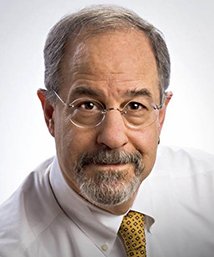 Ted Gup
Ted Gup
I approached this topic in class with some trepidation – I’m not a total fool. The students were remarkably respectful of each other. They addressed it in the context of media bias, objectivity — whatever that is — and press coverage.
I’m pretty damn close to being a First Amendment absolutist. I don’t give a damn what my students say, and I mean it. I listen and absorb, but I don’t impose regulations or rules on speech. I feel strongly that if you inhibit speech, you inhibit thought. I’m a great believer of John Stuart Mill and the value of dissent. So this subject plays to things I care about pretty deeply.
I tell students: You’re 18, 19, 20. The habits and ways in which you relate to your colleagues, and how you reconcile yourself to these pressures to conform, is how you will deal with them in the future. Your patterns are being set in real time. If you start policing your thoughts now, the real danger is the internal censor. Is that how you want to live your life?
I shared with my students a TED Talk by Nigerian novelist Chimamanda Ngozi Adichie called “The Danger of a Single Story.” It’s brilliant. It’s about the idea that we have an inclination to put people, cultures, and religions into a single narrative, and the perils of doing so. This transcends simplistic notions of balance and shows that facts and narratives should embrace complexity and nuance and resist cartoonish stereotypes and reductionism. It’s a good statement on how we get hijacked by one-dimensional narratives and is just perfect for journalism — and perfect for so much more.
I’m very proud of my students. They are engaged, bright. I’ve taught at elite institutions on occasion, and I’ve seen what happens when institutions become too doctrinal. So I was a little concerned coming here. Based on my students – they’re Muslim, Jewish, from Russia, all over — I’m bowled over by their willingness to listen to each other in a caring way. It’s really restorative.
Ted Gup, an award-winning journalist, author, and educator, is the 2023-24 Lang Visiting Professor for Issues of Social Change.


